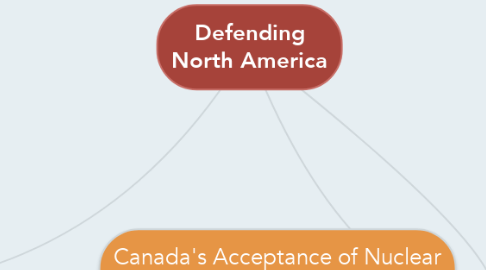Defending North America
by Victor Wong

1. The Scrapping of the Avro Arrow
1.1. Against
1.1.1. For
2. Canada's Acceptance of Nuclear Weapons in 1963
3. For
3.1. Most advanced fighter plane in the world for prior to the time. Elwy Yost said that, "it was the finest thing on Earth, and it was worth spending a few bucks on. When you get the very, very best."
3.2. The all Canadian plane was desinged to launch nuclear tipped missiles.
3.3. The Arrow represented a bold statement for it's national power and pride. A "national beauty" to behold. It was all Canadian made and designed.
3.4. Extremely fast.
3.5. The Arrow, a short four hour mini series was made to argue against that it would have been the finest jet interceptor in the world.
4. Against
4.1. Too expensive, because of "soaring production costs" and "few orders." No foreign orders for the arrow eventually became "a ramshackle, disorganized company." Right Honourable Men (Toronto: Harper Collins, 1994), 204
4.2. Jealousy of Americans because they couldn't build such a quality jet. "One popular view was that senior American officials conspired to kill the project because if they couldn't build a fighter of such quality, then neither should Canada." Financial Post, January 18, 1997.
4.3. Finkel and Conrad write that even the Canadian Air Force did not want to buy it, because it was "six times more to produce than its American counterpart." History of the Canadian Peoples (Toronto: Copp Clark Pitman, 1993)
4.4. Arrow skeptics argue that "it was over-rated and its test data fudged. At best not spectacular, and at worst, ordanary." CBC
4.5. It's effectiveness at a weapon was in doubt. Historian Jack Granatstein said that the arrow was to "shoot down Soviet bomber and not longer critical in the age of missiles."
4.6. Because the United States and the Soviet Union were moving towards missile systems, Prime Minister Diefenbaker felt that manned fighters would soon become obsolete. And in 1959, Canada bought Bomarc missiles from the United States, a supersonic long-range surface-to-air missile. This led Canada to make the choice of whether they would accept nuclear weapons as there new defense.
5. For
5.1. Vital to protect Canada against potential USSR bombers and missiles if they ever chose to attack.
5.2. The compactness and that it was remote controlled made it much safer to use.
5.3. The missile had a slant range of over 440 miles. a long-range surface-to-air missile.
5.4. Business leaders and newspapers wanted the Liberals to win because of the fear that Diefenbaker would injure trade and investment from the United States.
6. Canada's Role in the Cuban Missile Crisis
7. Against
7.1. Fear that if Canada were to arm themselves, they would put themselves in harms way for mutual assured destruction.
7.2. Conservatives wanted a "non-nuclear nation" and working towards disarmament
7.3. Many people were unhappy with the idea of having nuclear weapons, realizing that nuclear war amounted to global suicide.
7.4. Mutual assured destruction (MAD) would ensure that if one chose to attack the other, both would face complete annihilation.
8. For
8.1. In a poll, 80% Canadians were found to support the American action and believed that that they should have assisted immediately.
8.2. It would have tightened Canada and America's relationship if Diefenbaker had trusted in America.
8.3. U.S. have photographic proof that Soviets were building missile bases in Cuba.
8.4. Canada had signed an agreement and was a part of NORAD.
8.5. Behind Diefenbaker's back, the military and defense minister Harkness, defied the minister to put in affect all the procedures.
9. Against
9.1. Prime Minister Diefenbaker did not believe in photographs
9.2. Prime Minister Diefenbaker did not wanted to be involved in a conflict that mainly rooted with U.S. policy
9.3. Diefenbaker believed he was protecting Canadian interests and independence.
9.4. He preferred to send a fact-finding mission to Cuba, when Diefenbaker hesitated. Which implied that he did not have trust in the U.S.


